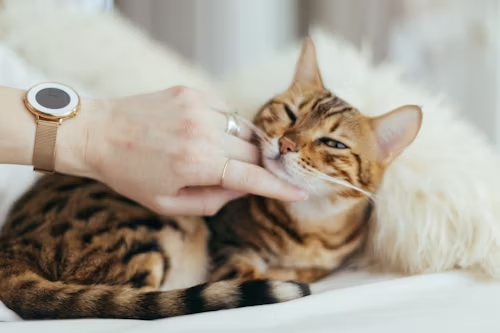Some cats see you as their parent, while others are convinced they are the real boss of the house. When a cat believes it’s in charge, it will often show dominant behaviors and take the lead in its daily routines—sometimes even trying to “claim territory” or “assert authority” through specific actions.Here are some common signs that your cat thinks it’s the head of the household. Check and see—does your cat show any of these behaviors?
- Taking Over the High Ground
A study observing 30 house cats over six months revealed that dominant cats spent around 35% of their day in elevated locations—such as windowsills, the tops of bookshelves, or the top of wardrobes. These high-up spots are more than just cozy nap zones; for cats, they’re strategic lookout points. Biologically speaking, being in a higher position gives cats a sense of control and safety. It allows them to survey their territory and mentally establish superiority. So if your cat frequently lounges above eye level, it might be silently signaling that it’s the real boss of the house. - Interrupting Whatever You’re Doing
When a cat believes it’s the alpha, it often tries to control your actions—and won’t feel the slightest bit guilty about it. That’s when you’ll notice more “interruptive” behaviors. For example, your cat might sprawl out on your laptop while you’re working, swat your book out of your hands while you’re reading, or walk across your body just as you’re trying to sleep. These actions might seem mischievous, but they’re actually subtle tests of influence. What’s more, if you respond—whether it’s a sigh, scolding, or laughter—your cat sees that as validation and is likely to repeat the behavior for attention or dominance.

- Not Covering Their Poop
Some cats instinctively cover their poop after using the litter box, but dominant cats often don’t. Studies show that cats with higher social standing tend to skip the burying step entirely. Why? Because they feel confident in their environment and see no reason to hide their scent. In fact, they might intentionally leave it uncovered as a way of marking territory—similar to how tigers use urine to define their turf. So if your cat consistently refuses to cover its waste, it could be making a not-so-subtle statement: “This is my domain.” - Displaying Aggressive Behavior
Cats with dominant personalities are more prone to exhibiting aggressive behaviors—but not out of random aggression. These actions often arise when the cat feels its boundaries are being violated. For example, if your cat hates being picked up but you insist on cuddling, it might bite or wriggle furiously to push back. In its mind, it’s asserting a clear boundary: “I’m in charge, and I didn’t say you could do that.” If your cat becomes aggressive in response to specific actions, it’s likely tied to this strong sense of personal space or territorial control.
Now you know—when a cat sees itself as the boss, it tends to show very specific behaviors. Taking over high spots, interrupting your activities, refusing to bury its poop, and displaying aggressive tendencies are all signs that your cat might be trying to assert dominance.So, how about your own kitty? What role do you think it plays in your household? Has your cat been acting like it runs the place?

